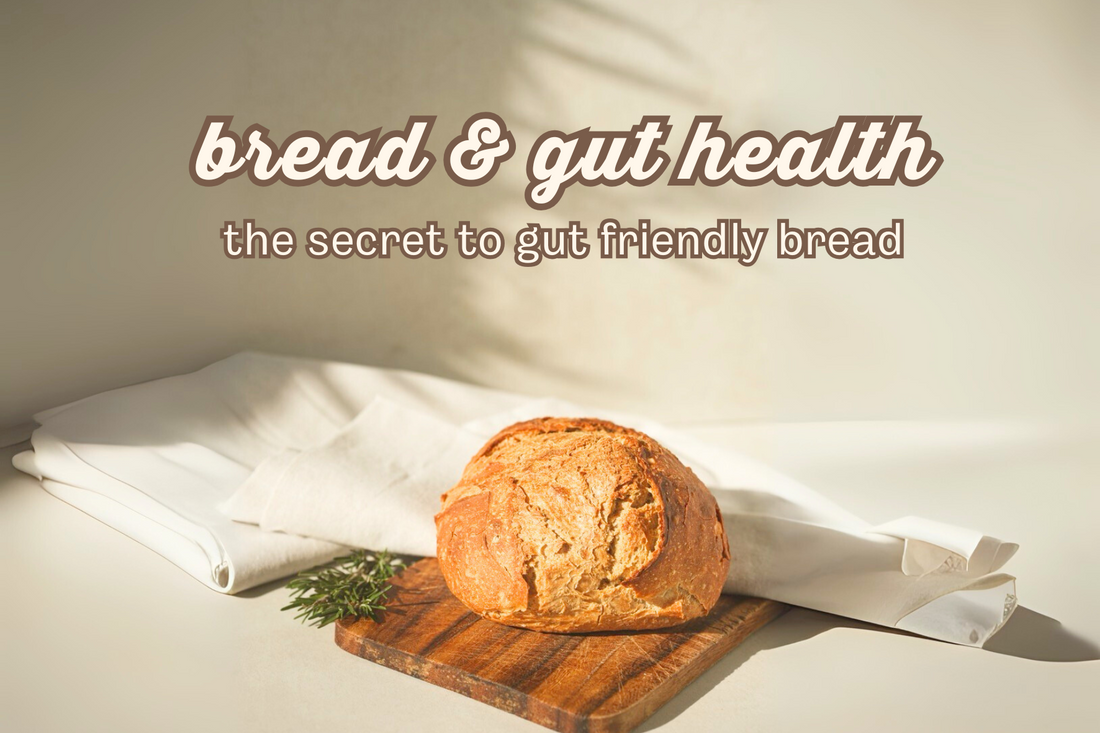
The Secret to Gut-Friendly Bread? Sourdough Mixes Like This One
Millys BestShare
If you’ve been wondering "what kind of bread is easiest on the gut?"
or Googled “gut-friendly bread” - ”bread for gluten sensitive people” - “digestible bread” or “bread that won’t bloat me”
— you’re not alone.
The truth? Not all breads are created equal.
And the answer to happier digestion might just be a slow-fermented, easy-to-bake, sourdough mix.
Like Millys. Let’s dive in.
Why So Many People Struggle with Bread
More and more people report feeling bloated, tired, or uncomfortable after eating standard white bread. Why?
Here’s what your typical store-bought bread brings to the table (and your gut):
- Refined flours with little fiber
- High level of FODMAPS & ATIs due to high production speed, linked to gut inflammation, metabolism disorder and bloating
- Fast-rise doughs, skipping fermentation
- Chemicals in grains used in the seeding, growth, harvest and milling process
- Emulsifiers and preservatives that may disrupt the microbiome
- List of chemicals that potentially irritate your system
- Added sugar and industrial seed oils




Is it the bread - or just modern bread?
Bread has long been a dietary staple — but for millions of people, it causes discomfort, bloating, fatigue, and even skin issues. Why?
The answer lies in modern food processing and how it impacts digestion and the gut microbiome.
❌ 1. Ultra-Processed Ingredients Disrupt Digestion
Most commercial breads are made from refined wheat flour, which has been stripped of fiber and nutrients. According to multiple studies, refined carbs and ultra-processed food can increase intestinal permeability ("leaky gut") and reduce microbial diversity in the gut microbiome
Additionally, industrial breads often contain:
· Emulsifiers (e.g. polysorbates, carboxymethylcellulose) – shown in animal studies to promote gut inflammation and disrupt microbial balance (Study in ‘Nature’ from 2015)
· Preservatives and dough conditioners – designed for shelf life, not gut health
❌ 2. Fast-Rise Doughs = No Pre-Digestion
Unlike traditional sourdough, most store-bought bread is produced with high-speed rising (as time = money).This eliminates the slow fermentation that normally:
· Breaks down gluten
· Breaks down FODMAPS
· Breaks down ATIs
· Reduces phytates (which block mineral absorption)
· Produces organic acids beneficial to digestion
As a result, the bread hits your gut in a form it struggles to break down — leading to bloating, gas, and nutrient malabsorption.
❌ 3. Gluten Sensitivity (Not Always Celiac)
While only ~1% of the population has celiac disease, up to 13% of people report non-celiac gluten sensitivity (NCGS), often triggered by poorly fermented wheat products. Symptoms include:
· Bloating
· Brain fog
· Fatigue
· Abdominal discomfort
❌ 4. Lack of Fiber and Prebiotics
Modern white bread contains very little prebiotic fiber. These are essential nutrients for feeding beneficial gut bacteria.
Low-fiber diets are associated with:
· Reduced microbial diversity
· Higher inflammation markers
· Slower transit time (constipation)
In short: Most commercial bread is built for speed and shelf life — not for your gut.
That’s why people are increasingly turning to gut-friendly alternatives like traditional sourdough or fermented bread mixes.
Which means…
… that you might not have a problem with bread in general – you might have a problem with modern, processed, poor quality bread.
Which means…
… home baked sourdough bread with premium ingredients could be a solution for you 😊
Hello Sourdough: The Gut’s Best Friend


Bread has served ancient civilizations – kings & queens, warriors, mothers & kids.
Bread is named at least 490 times in the bible, playing an important role.
Bread has been around human cultures for thousands of years. If it caused bloating and discomfort, people would have replaced it right?
Sourdough bread baking isn’t just a TikTok baking trend — it’s one of the oldest forms of bread fermentation. And it’s your gut’s favorite. Here’s why sourdough = gut-friendly gold:
✅ 1. Easier to Digest
Sourdough is made through a natural fermentation process using yeast and lactic acid bacteria. This breaks down:
- Gluten, making it easier for sensitive stomachs
- Phytic acid, which blocks nutrient absorption
- FODMAPs, the common culprits behind bloating
- ATIs, which can cause gut inflammation
People with gluten sensitivity (not celiac) often can tolerate sourdough better.
✅ 2. Supports Gut Flora
Sourdough doesn’t just sit better — it helps you thrive. The fermentation process produces prebiotics, which feed your good gut bacteria and help maintain a healthy microbiome. That means better digestion, mood, immunity, and more.
✅ 3. Naturally Low Glycemic Index
Unlike sugary white bread, sourdough digests slowly. It’s been shown to lower blood sugar response and keep you fuller longer — ideal for anyone watching carbs, managing insulin, or just avoiding the crash. According to the British Journal of Nutrition, sourdough bread produced a 20–50% lower blood sugar spike compared to regular white bread.
Did you know?
A 2019 study in Frontiers in Microbiology found that sourdough fermentation significantly enhances the digestibility and nutritional quality of wheat-based products.
European Flour: Less Tampered, More Digestible
The flour used in bread matters just as much as the fermentation. That’s why Millys uses heritage-quality wheat from Germany and Italy, which offers distinct advantages over many U.S. flours:
German & Italian Flour Standards:
· Often lower in glyphosate residues, as both countries restrict its use more strictly than the U.S. Many farmers fully restrict glyphosate which makes it easy to source high quality, glyphosate free flour.
· Typically milled at lower extraction rates → meaning more bran and germ (nutrient-rich)
· Higher focus on ancient or heritage grains like Einkorn, Emmer, or Spelt, which are naturally lower in gluten strength and often better tolerated
· Non-bleaching and chemical enrichment, resulting in a cleaner, less processed grain
European wheat varieties are often bred for digestibility and flavor, whereas U.S. wheat has historically been bred for yield and durability. Many European wheat varieties have not been modified for decades, making them robust and healthy.

In Italy …. I ate pizza & pasta all day long
Americans who struggle with U.S. bread report far fewer issues when consuming European breads, especially sourdough, pizza and pasta.
Even many self-diagnosed “gluten sensitive” Americans were surprised how great they felt after eating European bread, pizza & pasta.
Together: Fermentation + Quality Grain = Gut Love
When you combine the digestive benefits of long fermentation with the clean, naturally nutritious base of European flour, you get bread that:
· Supports the gut microbiome
· Is more digestible for sensitive stomachs
· Helps your body absorb key nutrients
· Is satisfying without the crash
In short: it’s bread that works with your body, not against it.
But Wait… Isn’t Sourdough Hard to Make?
That’s the catch. Traditional sourdough requires:
- Starter maintenance (that you feed daily, for days… or months!)
- Careful kneading, stretching, and folding
- Multiple sets of stretch & folds for hours!
- Hours (or days) of time and commitment
And that’s exactly why Millys exists.
Millys: Gut-Friendly Sourdough, Made Easy
Millys is a premium sourdough bread mix that skips the hassle and keeps the health benefits.
It’s:
· Premium European flour & sourdough that follow EU purity standards
· Flexible fermentation time, fitting in your schedule (between 2-18h)
· A just-add-water mix that makes real sourdough lazy-proof
· Beginner friendly, no equipment needed
· And no preservatives, added sugar, or industrial oils, no chemicals


And the best part? It bakes in 4 simple steps.
Americans Want Gut-Friendly Bread (Now More Than Ever)
Did you know:
- 68% of U.S. consumers seek out food products that support gut health
- Google searches for “gut-friendly bread” and “easy sourdough bread” have increased by over 130% since 2020
- Sourdough bread is projected to grow into an $800+ million market in the U.S. by 2030
Final Crumb of Advice
If your gut has been asking for better bread, it’s time to listen.
Sourdough offers the flavor, digestibility, and clean label benefits that your body deserves.
And with Millys, it’s never been easier to say:
- No to bloat
- No to additives
- Yes to real, slow-baked sourdough
- Yes to a mix that takes care of you
- Yes to a simple & time saving solution
- Yes to the taste of soft inside & crispy outside

Try Millys Today and discover what your gut has been craving all along.




1 comment
I hope this works! I’m passionate about finding a fresh high quality sourdough bread mix that’s healthier than store bought and consumer friendly.